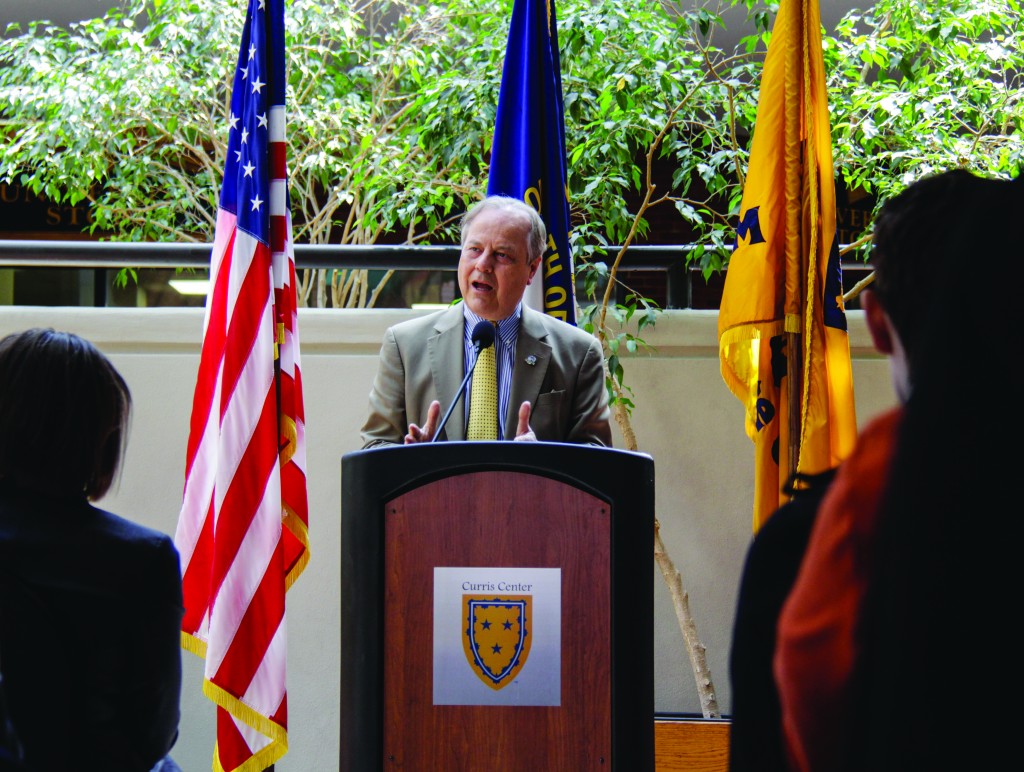
Rep. Ed Whitfield of Hopkinsville, Kentucky, held a town hall meeting attended by residents of Murray and Murray State students, administrators, and professors.
Whitfield, who graduated from the University of Kentucky, was first elected to Congress in 1994. Winfield Rose, a political science professor at Murray State, said Whitfield has been an asset to the county throughout the 18 years he has represented Calloway County.
“He has been a very devoted friend on Murray State and the political science department,” Rose said. “We are glad to have his friendship.”
Whitfield opened the meeting by emphasizing the importance of giving the public a chance to air their views and opinions in an open forum.
Whitfield was asked what the political plan was for rising tuition costs for college students, and the lack of student jobs on campus, in Washington. Whitfield said currently the delinquency rate for student loans is 33 percent, and the amount of student debt has exceeded the national credit card debt.
“It’s a very real problem,” Whitfield said. “It’s something we need to focus on.”
Whitfield also acknowledged the disenchanted attitude of the public toward Congress, stating that the approval rating for Congress hovers between 12 to 13 percent.
Whitfield asked that constituents remember that some issues between parties are irreconcilable.
“The American people should understand that the differences are so fundamental in some cases that it’s sometimes impossible to compromise,” Whitfield said.
Whitfield pointed out the stark difference of opinion on the use of coal in the United States, and the future of the coal mining industry. He said that while he supports the use of green energy, it is important to find middle ground on the issue.
As of January 21, the Environmental Protection Agency put into effect new regulations on carbon dioxide emissions, effectively banning the construction of new coal plants in the United States. Whitfield called this action radical, giving China, India and Germany as examples of countries continuing to build coal plants. Whitfield said the German government had been replacing its nuclear facilities with coal plants.
“No only can we burn coal, we should burn coal,” Whitfield said. “If we want to stimulate our economy for green energy, we need a vibrant economy with fossil fuels.”
Whitfield challenged the new regulations, saying the EPA did not take into consideration the cost of lost jobs, healthcare for those put out of work, and the increased cost of electricity without coal. He also stated his objection to a new ban on the use of corn-based ethanol in cars in California.
With the ban in place, the state government of California has been using ships, fueled by diesel, to bring in sugar cane-based ethanol from Brazil. Whitfield said emissions from the diesel ships outweigh the emissions from corn-based ethanol.
Richard Heath, the representative of Graves County in the state legislature, asked Whitfield to express his view on the future of the newly passed hemp regulation bill, which still has to cut through federal red tape. Kentucky was the first to legalize the growth of industrial hemp.
Whitfield said there will be efforts to obtain a waiver from the federal legislature, echoing Kentucky Senator Rand Paul’s pledge to push for a waiver once the regulation framework has been created and put in place.
The hemp bill, if cleared by Congress, is projected to create hundreds of jobs in the Commonwealth, helping to pull Kentucky out of the recession.
Whitfield was asked about funding for the arts, and could only say that money for the arts was hard to find with the fiscal cliff looming over the nation. Whitfield said with the government $17 trillion in debt, there are going to be fewer tax breaks for the arts.
In the realm of government spending, Whitfield said a big question on Capitol Hill is the role of the federal government in providing money to startup businesses.
“America is the great country it is today because, since the first Congress in 1789, we’ve had people willing to build the country into what it is,” said Whitfield.
Whitfield cited the Wright brothers and Alexander Graham-Bell, as men who brought their dreams to fruition on their own dime, and George Kaiser, who backed the failed federal investment in Solyndra.
Solyndra, a solar panel manufacturer, was granted a $528 million loan from the federal government in 2009. The loan was allegedly passed because of the high support from Kaiser, who is one of the United States’ 50 richest people. Solyndra filed for bankruptcy in 2011, just two years after receiving the loan.
Whitfield ended his talk with applause from the audience, and stayed after to answer any lingering questions.
Story by Amanda Grau, Staff writer.




























































































